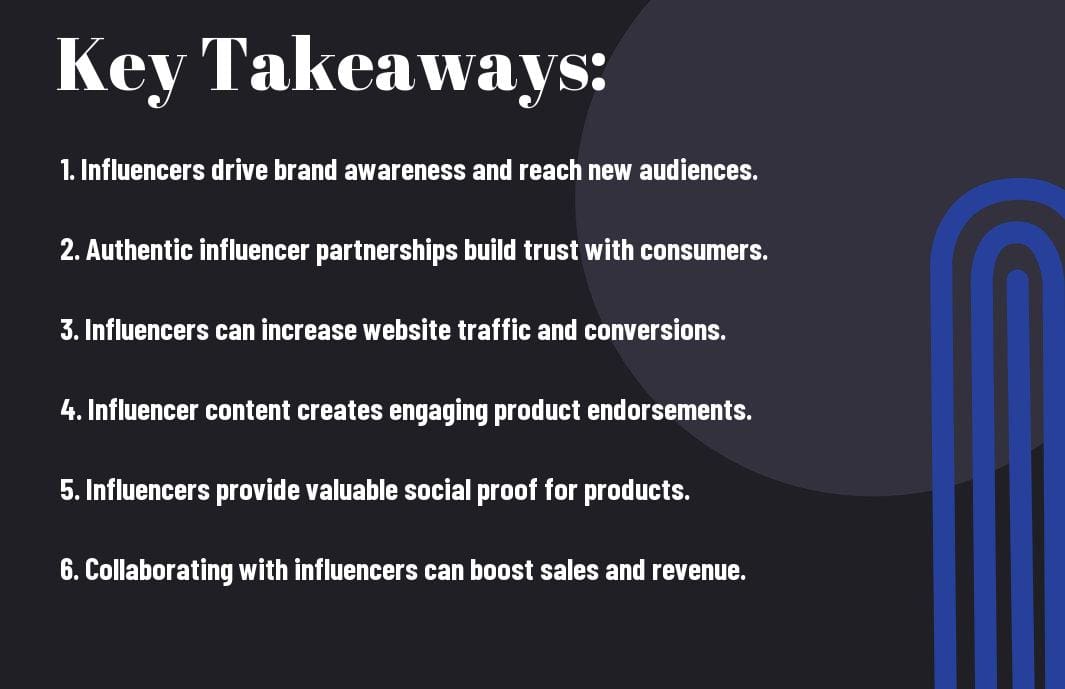You might be wondering, what exactly is the impact of influencer marketing on the success of e-commerce businesses? Influencer marketing has become a powerful tool for brands looking to reach their target audience in a more authentic and engaging way. By partnering with influencers who have a loyal following, businesses can increase brand awareness, drive traffic to their online stores, and ultimately boost sales. In today’s digital age, where consumers are turning to social media for product recommendations and reviews, influencer marketing has emerged as a game-changer for e-commerce success.
Key Takeaways:
- Increased brand awareness: Influencer marketing can help e-commerce businesses reach a wider audience and increase brand visibility.
- Higher credibility and trust: Collaborating with influencers can build credibility for a brand and establish trust among consumers, leading to higher conversion rates.
- Drive sales and revenue: Influencer marketing campaigns have the potential to drive sales and revenue by leveraging the influencer’s audience to promote products or services.

Understanding Influencer Marketing
There’s no denying the impact of influencer marketing in today’s e-commerce landscape. With the rise of social media, influencers have become a powerful tool for brands to reach their target audience in a more authentic and engaging way.
Definition and Types of Influencers
The term influencer marketing refers to the strategy of partnering with individuals who have a dedicated following on social media to promote a brand or product. There are several types of influencers, ranging from micro-influencers with a smaller, niche audience to celebrity influencers with millions of followers. Mega-influencers fall somewhere in between, with a larger reach than micro-influencers but not as extensive as celebrity influencers.
- Micro-influencers – Influencers with a smaller, niche audience
- Mega-influencers – Influencers with a larger reach than micro-influencers
- Celebrity influencers – Influencers with millions of followers
Knowing the differences between these types of influencers is crucial in determining the best strategy for your e-commerce success.
| Micro-influencers | Mega-influencers |
| Smaller, niche audience | Larger reach than micro-influencers |
| Higher engagement rates | More expensive than micro-influencers |
| Authenticity and trust | Broader audience but less targeted |
| Cost-effective for smaller brands | Potential for wider brand exposure |
| Long-term relationships with brands | Potential for more immediate impact |
The Psychology Behind Influencer Impact
The influence of psychology in the success of influencer marketing cannot be understated. Consumers are more likely to trust and engage with a brand when it is recommended by someone they admire and follow. The emotional connection that influencers build with their audience plays a significant role in driving purchasing decisions.
The Mechanics of Influencer Marketing in E-commerce
Many e-commerce businesses are turning to influencer marketing as a key strategy to drive success in the competitive online marketplace. In a recent article on The Influence of Influencer Marketing in eCommerce, it was noted that influencer marketing can greatly impact brand visibility, customer engagement, and ultimately, sales.
How Influencer Partnerships are Formed
Any successful influencer partnership starts with identifying the right influencers who align with the brand’s values and target audience. This involves thorough research to ensure the influencer’s following is genuine and engaged. Once potential influencers are identified, brands can reach out with collaboration proposals that outline the terms of the partnership, including content expectations, timelines, and compensation.
Strategies for Effective Campaigns
Partnerships are crucial in developing effective influencer marketing campaigns. This collaboration between e-commerce brands and influencers can take various forms, including sponsored posts, product reviews, giveaways, or affiliate marketing. By leveraging the influencer’s credibility and reach, brands can significantly expand their online presence and reach new audiences. It is important for brands to establish clear goals and expectations for the campaign, monitor performance metrics, and adapt strategies as needed to maximize impact.
Measuring the Impact of Influencer Marketing
To understand the true impact of influencer marketing on e-commerce success, it is crucial to analyze the data and metrics. According to The role of influencer marketing in the growth of e-commerce, measuring the effectiveness of influencer campaigns is necessary for businesses aiming to optimize their strategies and maximize ROI.
Key Performance Indicators (KPIs) and Metrics
One way to measure the impact of influencer marketing is by tracking key performance indicators (KPIs) such as engagement rates, conversion rates, and reach. These metrics can provide valuable insights into the effectiveness of influencer collaborations and help businesses determine the success of their campaigns. By analyzing KPIs, e-commerce brands can make informed decisions and optimize their influencer marketing efforts for better results.
Tools for Tracking and Analysis
Any successful influencer marketing strategy requires the use of tools for tracking and analysis. These tools can help businesses monitor the performance of their campaigns, track ROI, and measure the impact on sales and brand awareness. By utilizing advanced analytics platforms and social media monitoring tools, e-commerce brands can gain valuable insights into the effectiveness of their influencer campaigns and make data-driven decisions for future strategies.
Another important aspect of using tools for tracking and analysis is the ability to identify fake followers and engagement. By detecting fraudulent activities, businesses can ensure that they are partnering with genuine influencers who can truly impact their e-commerce success. This helps in maintaining authenticity and credibility in influencer marketing campaigns.
Influencer Marketing Platforms and Technologies
Once again, it’s imperative to acknowledge the pivotal role that influencer marketing platforms and technologies play in the success of e-commerce businesses. These tools are instrumental in helping brands discover, connect with, and manage the right influencers for their campaigns.
Platforms for Influencer Discovery and Management
For e-commerce businesses, having access to platforms like Influencity, Upfluence, and AspireIQ is crucial for effective influencer discovery and management. These platforms offer robust features such as influencer search filters, performance analytics, and campaign management tools, making it easier for brands to identify the most relevant influencers for their target audience and track the success of their campaigns.
Emerging Technologies in Influencer Marketing
The emergence of AI-powered tools and blockchain technology is revolutionizing the influencer marketing industry. AI algorithms can analyze vast amounts of data to identify the best influencers for a brand, predict campaign performance, and automate many aspects of influencer management. On the other hand, blockchain technology is enhancing transparency and security in influencer marketing by providing immutable records of influencer collaborations and ensuring fair compensation for all parties involved.
The integration of these emerging technologies in influencer marketing not only increases efficiency and effectiveness but also helps in combating issues such as fake followers and engagement fraud, ultimately leading to more authentic and impactful influencer campaigns.
Best Practices in Influencer Marketing for E-commerce
Selecting the Right Influencers
Best practices in influencer marketing for e-commerce start with selecting the right influencers. Unlike traditional marketing, where reach and popularity are the main criteria, e-commerce brands should focus on relevance and engagement when choosing influencers. It’s important to partner with influencers whose values align with your brand and whose audience matches your target market. By selecting influencers who genuinely resonate with your brand, you can ensure that their followers are more likely to trust their recommendations and convert into customers.
Creating Authentic and Engaging Content
Selecting the right influencers is crucial, but it’s equally important to ensure that the content they create is authentic and engaging. E-commerce brands should collaborate closely with influencers to develop content that feels genuine and resonates with their audience. Authenticity is key in influencer marketing, as today’s consumers are savvy and can easily spot inauthentic endorsements. Engaging content that tells a story or showcases the influencer using the product in a natural way is more likely to drive interest and conversions.
The success of influencer marketing in e-commerce hinges on the ability to create content that feels organic and compelling. Brands that can strike the right balance between promotional messaging and authentic storytelling are more likely to see positive results from their influencer collaborations.
Ethical Considerations and Regulations
Disclosure and Transparency
With the rise of influencer marketing in e-commerce, there has been a growing concern about the lack of transparency and disclosure in influencer partnerships. Despite the benefits of influencer marketing, it is crucial for brands and influencers to be transparent about their partnerships to maintain trust with consumers. When influencers promote products without disclosing their relationships with brands, it can mislead consumers and blur the lines between organic and sponsored content.
Navigating the Regulatory Landscape
One of the key ethical considerations in influencer marketing is navigating the regulatory landscape. One of the major regulations that influencers and brands need to be aware of is the Federal Trade Commission (FTC) guidelines on endorsements. These guidelines require influencers to disclose any material connection to a brand when promoting products.
It is necessary for influencers and brands to familiarize themselves with these regulations to avoid potential fines and maintain credibility with their audience. It is also important for brands to establish clear guidelines and policies for influencer partnerships to ensure compliance with regulatory standards.
The Future of Influencer Marketing in E-commerce
Trends Shaping the Influencer Landscape
Landscape: Noteworthy trends are shaping the influencer marketing landscape in e-commerce. One key trend is the rise of nano and micro-influencers as preferred choices for brands. These influencers with smaller, more niche followings are proving to have higher engagement rates and deliver more authentic content, making them valuable partners for e-commerce businesses. Another trend is the shift towards long-term partnerships over one-off campaigns, as brands seek to build stronger relationships with influencers and their audiences.
Predictions for the Role of Influencers in E-commerce
Any: As we look ahead, predictions for the role of influencers in e-commerce remain optimistic. Influencers will continue to play a critical role in shaping consumer purchasing decisions, with their authentic and relatable content driving engagement and conversions. Moreover, we can expect a further blurring of lines between content and commerce, as influencers become not just endorsers but also creators of products and brands themselves.
Ecommerce: In the evolving landscape of e-commerce, brands must stay abreast of these trends and predictions to leverage influencer marketing effectively. The ability to adapt and collaborate with influencers in innovative ways will be crucial for e-commerce success in the future.
Final Words
With these considerations in mind, it is evident that influencer marketing plays a crucial role in the success of e-commerce businesses. By leveraging the reach and authority of influencers, brands can effectively target their desired audience, build credibility, and drive sales. Influencer marketing has become a powerful tool in the modern digital landscape, providing a unique way for businesses to connect with consumers and drive engagement.
As e-commerce continues to evolve, influencer marketing will only become more important for businesses looking to stand out in a crowded market. By partnering with the right influencers and creating authentic, engaging content, e-commerce brands can tap into the vast potential of influencer marketing to drive growth and achieve long-term success in the digital space.
FAQ
Q: What Role Does Influencer Marketing Play In E-commerce Success?
A: Influencer marketing plays a crucial role in e-commerce success by leveraging the social influence of individuals to promote products or services, reaching a wider audience, increasing brand awareness, and driving conversions.
Q: How does Influencer Marketing Impact E-commerce Sales?
A: Influencer marketing has a direct impact on e-commerce sales by influencing consumer purchasing decisions through authentic recommendations, product reviews, and endorsements from trusted influencers.
Q: What Makes Influencer Marketing Effective in E-commerce?
A: Influencer marketing is effective in e-commerce due to its ability to target specific niche audiences, build trust with consumers, create engaging content, and provide measurable results in terms of ROI and sales performance.
Q: How Can E-commerce Businesses Partner with Influencers?
A: E-commerce businesses can partner with influencers by identifying relevant influencers in their industry, establishing mutually beneficial partnerships, setting clear campaign objectives, and monitoring performance metrics to achieve desired outcomes.
Q: What Platforms are Ideal for Influencer Marketing in E-commerce?
A: Social media platforms like Instagram, YouTube, TikTok, and Facebook are ideal for influencer marketing in e-commerce due to their visual nature, popularity among consumers, and ability to reach large and engaged audiences.
Q: Is Influencer Marketing Cost-Effective for E-commerce Businesses?
A: Influencer marketing can be cost-effective for e-commerce businesses when compared to traditional advertising methods, as it allows for targeted reach, higher engagement rates, and the potential for viral sharing, leading to increased brand exposure and sales.
Q: How Can E-commerce Businesses Measure the Success of Influencer Marketing Campaigns?
A: E-commerce businesses can measure the success of influencer marketing campaigns by tracking key performance indicators such as website traffic, click-through rates, conversion rates, social media engagement, sales attribution, and return on investment (ROI).




